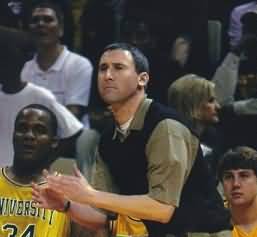Basketball Coaching - Tips on Entering the Coaching Profession - by Ari Fisher
The Coach’s Clipboard Basketball PlaybookAri Fisher has coached on all levels except professionally. He started his career as the third assistant at LSU during the tenure of Dale Brown. He was on staff for four seasons; two as a GA and two as restricted earnings coach from 2003-06.
Coach Fisher was also the Head Boys' Basketball Coach and Associate Athletic Director at University Lab School from 1997-2008. His teams won Louisiana High School Class AA State Championships in 2002 and 2004. He was selected district coach of the year four times (1998, 2002 – 2004) and state coach of the year in 2004. His 2004 team finished ranked # 17 nationally.

Coach Ari Fisher
Afishe@lsu.edu or af2002004@gmail.com
Here are some tips from Coach Ari Fisher on how to get into the basketball coaching profession. From time to time, someone will ask me about how he/she can become a coach... well here are some suggestions that will help. - Coach Gels
- Obtain a college degree (preferably in HPE) so you can teach. Master's degree suggested if you want to coach college. Courses to take as electives in college: public speaking, sociology, psychology, coaching, history, english.
- Watch coaches during games attempting to understand decisions instead of criticizing.
- Personal emotional traits needed for success: strong value system, good self-esteem, integrity, and effective communication skills. Know the jargon of your sport. Have a thick skin because coaching is a public profession and you will be criticized. Develop an imagination: schemes in any sport are already discovered so you won't invent anything; but you take something and put your own twist in it.
- Make sure you know how to manage time, space, and people. If you are sloppy, disorganized, and unprepared you won't last long in the profession. Work as if everything you do would be chronicled in the local newspaper.
- You probably will begin as an assistant on the middle/high school level: be loyal, suck scum- a Don Meyer term (no job is too small for you-John Wooden swept the court before each practice), be prepared, work beyond what is necessary, never say no, have a good knowledge of the game, and work as if you were the head coach. When you're through improving, you are through. Read: "Make the Big Time Where You Are, Eleven Rings" and other books you might find useful.
- Should you coach children or young adolescents, the major goal is to develop appreciations for exercise and physical fitness. Not winning the league.
- Must understand the fact that "coaching is teaching". You can't be poor at explaining things if you want to be successful. Additionally you have to possess patience.
- Have some PIE: passion, intensity, enthusiasm. Create a working philosophy for you and your team. BE YOURSELF- when I stopped being Bobby Knight or Dale Brown or Rick Pitino we won.
- Preparation, preparation, preparation= motivation. A speech or movie clip or guest speaker is not true motivation; it might last a few minutes but if players are prepared for every eventuality it will develop a sense of confidence and players will want to show it off in games.
- Make where you are coaching important; even a small YMCA team or college team. Don't get caught up in winning. Focus on reaching your potential as a team (might be one win or a championship). It doesn't matter where you coach; it matters why you coach (another Don Meyer thought). Allow players some ownership of the process. Success is a long hard process. Don't overcoach, players should never be robotic and unable to make decisions during games.
- Never label a player; label a behavior or certain play but keep dignity intact. Coaching is not an adversarial relationship as everyone is on the same side. Labeling is mean and if the player begins to believe the label then you've lost any effectiveness they might provide.
- Be a transformational coach and not transactional. Be in control of your emotions and rational in lieu of emotional with decision making. You have to 'play well with others' and handle difficult people.
- It is true? Is it kind? Is it necessary? Answer those questions before speaking.
- Top of the mountain and bottom of the valley. Likely you will be in both places during your career. Be able to handle success and failure.
FUNDAMENTAL TRUTHS OF HUMAN RELATIONS RELATED TO PROFESSION OF COACHING
- You can say or do something in an instant that can ruin someone for life.
- Nothing in life is more expensive than regret.
- Loyalty, trust, integrity and honesty are the building blocks of relationships.
- We are responsible for what we say or do; regardless how we feel physically or mentally.
- I have a right to anger, but not bigotry or cruelty.
- The worst thing you can do to another person is make them feel their ideas, thoughts, opinions, or mere presence does not matter.
- Our background and environment determine who we are, but our actions determine who we become.
- Being rational and calm is always better than confrontation.
- Don't become a prisoner to angst, sarcasm, or bitterness.